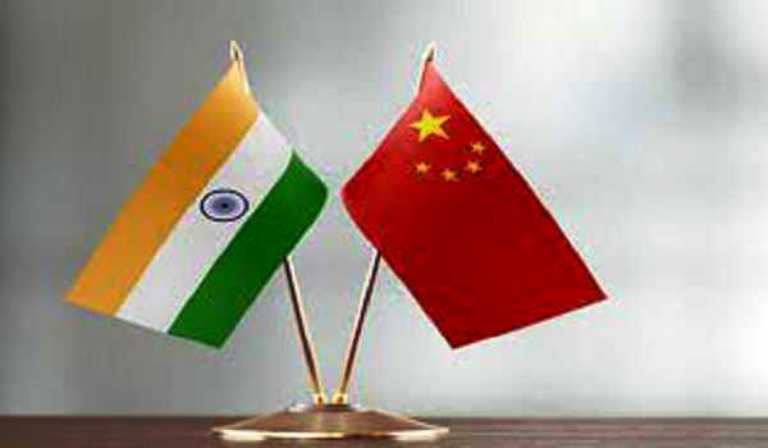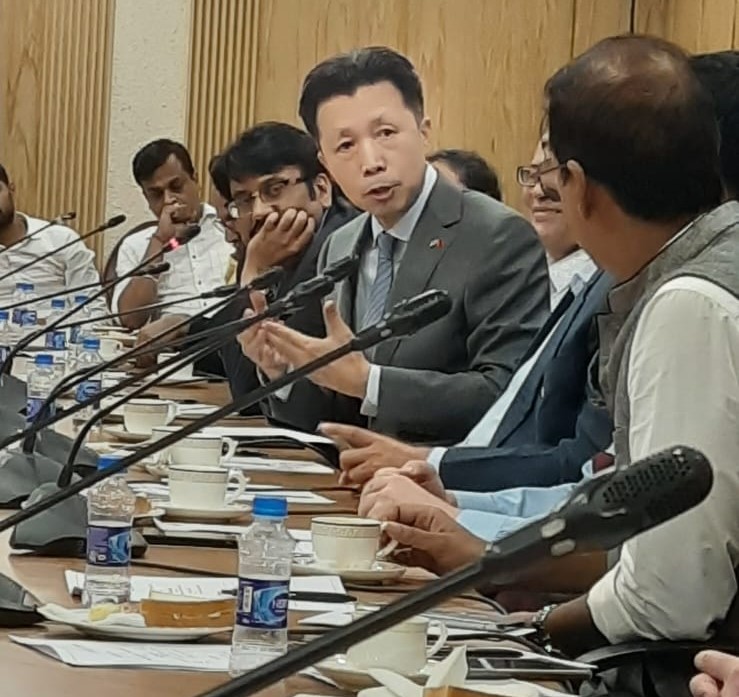 Sino-India Trade Relation
Sino-India Trade Relation
Linking bilateral trade to border tension not a good stance by India, says Chinese diplomat
Kolkata: The Chinese companies are hit by uncertainty and don't feel at ease doing business in India owing to the treatment and the policies of the Indian government, the Chinese Consulate General in Kolkata Zha Liyou Thursday said.
While he noted that India and China have border issues, he asserted that bilateral trade should not be linked to politics as other important issues like feeding a huge population and providing better lives to the people should take priority.
His remarks come in the background of multiple Enforcement Directorate (ED) raids, bank account seizures and court cases against top Chinese phone makers in India like Xiaomi, Vivo and Oppo. The probe agency has slapped money laundering charges involving thousands of crores of rupees on these companies.

"Whenever we speak of country-to-country relationships, we tend to lean towards politics. Everybody talks about border issues, human rights issues, and big issues as if those are the only things. We have issues between India and China, those issues are big but we have bigger things too. The biggest issue is how people get fed, how people live a good and decent life," he said at an MCCI event themed "Managing India-China Trade".
Zha Liyou's remarks are only a repetition of China's long-standing policy. It would like India to put behind the border dispute and normalize trade relations but New Delhi believes normalization cannot come on the back of Beijing's aggression in the border areas.
Taking the discussion further on how India is losing after a crackdown on Chinese businesses, the Chinese diplomat said the Sino-India bilateral trade has grown to a record $125 .66 billion in 2021, breaching the $100 billion mark for the first time, even as non-financial direct investment from China to India has been only $ 63.1 million which was a y-o-y decrease of 68.3 percent.
"This tremendous 42.3 percent y-o-y jump in trade volume in 2021 happened despite the huge fall in Chinese investments in India...this means we are investing less but you are buying more from us," he said. "This downturn will inevitably impact our future trade."
It is clear that China is not happy with New Delhi's approach to restrain the progress of its business interests in India after the Galwan Valley clashes in June 2020 and the persistent instability along the Line of Actual Control (LAC).
"In these circumstances, managing the India-China relationship is neither right nor incorrect. It is not so right as the Indian government has done a lot of things that have made Chinese companies uncomfortable...not easy for them to think that 'we are doing business with ease,'" he said.
He also pointed out India's huge trade deficit with China. "If there is a deficit we need to think about why there is an imbalance. We want to reduce this deficit. No one wants a deficit because that is not friendship, it must be balanced."
He attributed this trade deficit to the difference in the industrial structure and manufacturing scale between India and China and that it is "an inevitable outcome" of this difference.
The Diplomat South Asia editor Sudha Chandran notes in a March 2022 article that China's assertion that India should put border issues on the back-burner and cooperate with regard to economic development as in the Belt and Road Initiative, for instance, and forge common positions with Beijing at global forums, is not new.
It dates back to 1988 when it was suggested by Deng Xiaoping, who is hailed as the "Architect of Modern China" and for his contributions that catapulted the country to the rank of the world's second-largest economy in 2010. He had suggested that the border dispute is “for future generations to resolve.”
Chandran points out that even as India accepted that proposal, "hoping that cooperation in other fields would build bilateral trust, paving the way for a settlement of the border dispute" it has festered and only grown in complexity while cooperation, especially trade, did grow rapidly.
Chinese Foreign Minister Wang Yi's suggestions during his India visit in March were reiterations of the same suggestions.
Zha Liyou further said: "More than 150 countries have China as their largest trading partner. This was 40 in 1978."
Referring to China-EU bilateral trade, he said the grouping is the biggest trading partner of China with the trading volume reaching 586 billion euros in 2020.
"As many as 659 of the EU's 5,600 categories were imported mainly from China. This is because Chinese goods meet EU quality and price requirements," he said, apparently rubbishing theories of tactical capture of world trade by the dragon nation.
Zha Liyou claimed that this was true for ASEAN countries as well as the US.
"Bilateral trade is a reflection of economic laws...China follows economic rules," he said.
Despite the claims, China, which is aspiring to be a hegemonic power, is controlling not just exports but also using its overall economic strength to assert influence across the globe.
Experts note that China's integration into the global economy has been fast since it became a full member of the World Trade Organization (WTO), but it never did follow the organization’s underlying values for free trade in spirit.
While it has access to open trade across the world taking advantage of WTO norms, its domestic economy has been described as a ‘black box’ due to opaque political and economic decision-making, and notoriously unreliable data provided for the benefit of CCP, notes an Economic Times report.
Chinese mercantile behavior also manifests in the form of ‘dumping’, i.e., selling a commodity in another country at a price lower than its own domestic market. India and the US have been the biggest victims of this policy, especially with regard to electric commodities, aluminum and steel, it further notes.
Zha Liyou stated that India is an emerging market with many opportunities. India's GDP growing at 13.5 percent, is very fast, and very promising.
The development of Sino-India economic and trade cooperation is conducive to the development of people and businesses of our two countries, and it is also conducive to the development of Asia and the world, he said.
"Many people talk about the Asian century... China and India are two major driving forces....But the difficulty and challenges we are facing today because of the Indian policies continue to signal uncertainties for Chinese businesses in India," he said.
China-India trade relations should be viewed from a long-term vision, Zha Liyou iterated.
Experts note that China is frustrated by India's unwillingness to back down, despite odds at Galwan. India is a market, it cannot lose.
The Centre's decision to ban Chinese apps, cut down imports of power and solar equipment, prevent the involvement of Chinese companies in India’s development projects, monitor closely and even block Chinese investments have affected China, say experts.
Elaborating on why the two countries cannot grow apart, Zha Liyou further asserted that China and India are neighbours and also the future dubbed "the Asian century".
"India cannot ignore China, China is big. Likewise, it is unrealistic for China to ignore India. Both are huge," he said.
Asserting further that India needs China to develop economically, Liyou said New Delhi needs to take the road of industrialization to deal with the employment pressure as a result of a huge and continuously growing population.
Emphasising that having Beijing as an ally in achieving its economic goals would be in India's favour, he said: "It is not a smart strategy of Indian politicians not to deeply integrate into the global industrial chain, further industrial integration with China. Currently, this link is not very strong.... I think as Consular General we could be smarter."
A Goldman Sachs estimate suggests that India's economy will surpass the US economy by 2043, Zha Liyou said and pointed out that improving the level of trade with neighbouring countries was one of the 10 important pieces of advice given by the financial instiution to India.
"This certainly includes China...India is the world's pharma factory but needs to import from China. India cannot ignore China," he emphasised. "A low cost, good environment partner is waiting, use it...otherwise it is not smart business. We can be smarter than this."
He also laid stress on province-to-province relationships and how India can benefit by integrating those in the supply chain involving bilateral trade. He pointed out that the few India has with China are underutilized,
"Earlier we could use WeChat in India, but now we cannot. That makes your deal difficult not mine," he said, reflecting strong disapproval over India's instant ban on scores of Chinese apps post-Galwan Valley clash overlooking their huge user base in India.
He further highlighted how a top Chinese mining equipment company has been blocked by the government from placing bids for projects or even investing in India.
"China has always been clear that India can improve the business environment, treat all Chinese companies in a fair, transparent, and non-discriminatory manner and normalize trade relations between our two countries," he said.
He urged the Indian business chambers to lobby with Indian leaders to come closer to China at least halfway and "I will lobby with mine". "Currently, we are apart," he said.
Support Our Journalism
We cannot do without you.. your contribution supports unbiased journalism
IBNS is not driven by any ism- not wokeism, not racism, not skewed secularism, not hyper right-wing or left liberal ideals, nor by any hardline religious beliefs or hyper nationalism. We want to serve you good old objective news, as they are. We do not judge or preach. We let people decide for themselves. We only try to present factual and well-sourced news.







